Share
Working at ESO
Are you interested in working in areas of frontline technology and in a stimulating international environment? Do you feel your profile matches our requirements? Learn more about our current vacancies and apply online. Read more..
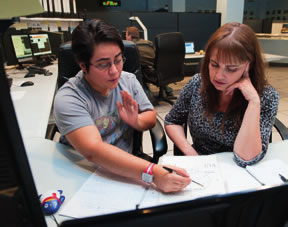
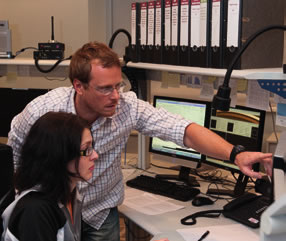

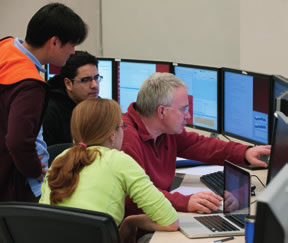
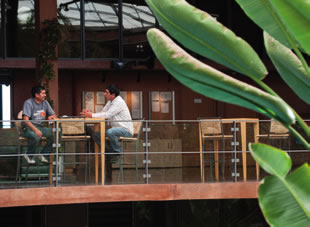

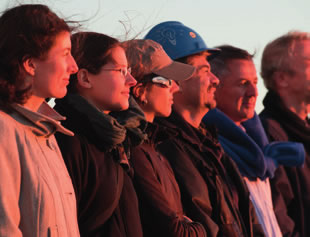
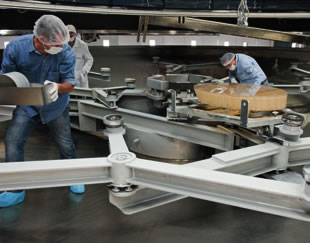
The European Organisation for Astronomical Research in the Southern Hemisphere (ESO) is the foremost intergovernmental astronomy organisation in Europe and the world's most productive ground-based astronomical observatory. ESO carries out an ambitious programme focused on the design, construction and operation of powerful ground-based observing facilities enabling astronomers to make important scientific discoveries.
ESO operates three unique world-class observing sites in northern Chile: La Silla, Paranal and Chajnantor (home to ALMA and APEX), and the ESO Headquarters are located in Garching, near Munich, Germany.
At Paranal, ESO operates the Very Large Telescope, the world's most advanced visible-light astronomical observatory, and will host and operate the southern array of the Cherenkov Telescope Array, the world's largest and most sensitive high energy gamma-ray observatory. ESO is a major partner in ALMA, the largest astronomical project in existence. And on Cerro Armazones, ESO is building the 39-metre Extremely Large Telescope (ELT), which will become "the world's biggest eye on the sky" and whose operations will be fully integrated into the Paranal Observatory.
For its ALMA Regional Centre at its Headquarters is advertising the position of
ALMA Regional Centre Astronomer
Garching
Deadline 16/11/2024
The ALMA Regional Centre (ARC) department at ESO provides the interface between the European ALMA Users Community and the ALMA observatory in Chile. In coordination with the ARCs in the other ALMA partner regions, the ARC at ESO promotes and provides support of the highest standards to the ALMA user community and to ALMA observatory global operations. The ESO ARC provides important services for the development and operation of ALMA, including software development and testing, Call for Proposals and observation preparations, participation in observing shifts at the ALMA observatory, delivery of quality-assured data products for principal investigators and archive users, and optimisation of capabilities. ALMA is also currently undergoing an ambitious upgrade - the Wideband Sensitivity Upgrade (WSU) - and the ARC is heavily involved in the planning and investigations needed to transition to WSU Operations at around the end of the decade.
The ARC at ESO is looking for an astronomer with a strong research profile in radio and/or millimetre astronomy. As a member of the ESO ARC and of the ESO Faculty, you will be given the opportunity to interact with other researchers at ESO and contribute to ESO's diverse scientific life. You should demonstrate scientific drive and vision to conduct high-impact independent research. Furthermore, you should have a strong interest in maximising ALMA's scientific output by leading operations support and user support tasks. As the ARC astronomer you will contribute to core ARC duties, in particular quality assurance, in coordination with colleagues at the ESO ARC, the European ARC network and the other ALMA partners, as well as to tasks leading to the optimisation of science operations. Expertise areas that are currently under-represented among the ESO faculty are encouraged. For an overview of the science expertise in Garching see here (https://www.eso.org/sci/activities/garching.html).
Main Duties and Responsabilities
- Play a key role in the ALMA processes targeting the optimisation of the scientific products that come out of this world-leading facility; this task includes, but is not limited to, co-managing both manual and pipeline data reduction runs, overseeing reprocessing efforts, and contributing to the pipeline weblog review process and its optimisation;
- Perform general ARC duties, including answering Helpdesk tickets, contributing to testing of tools and playing a proactive role in the improvement of user documentation;
- Undertaking Astronomer-on-Duty shifts in Chile;
- Constructively work together with other ARC staff and ALMA operations staff around the globe;
- As a member of the ESO Astronomy Faculty, you will be expected and encouraged to conduct a strong personal research programme and to participate actively in the scientific life of ESO and interact with other parts of the wider organisation;
- The tasks are not limited to the above and a flexible approach and willingness and capability to adapt is required.
Reports to:
The post holder reports to the Head of the ALMA Regional Centre (ARC) Department. The ARC is a department of currently 13 highly skilled and motivated staff and is part of the ESO ALMA Support Centre (EASC) division.
Key Competences and Experience:
Essential Competences and Experience
- Active astronomical research at least at postdoctoral level with a solid publication record and continuing high-impact research activity in astronomy;
- Practical experience with astronomical radio/millimetre observing techniques and data analysis;
- Excellent cross-disciplinary communication skills, both oral and written;
- Demonstrated ability to work effectively in a team, have an eagerness to contribute to team performance, and a positive approach toward building links across teams in an international multi-cultural environment.
- Pro-active approach to contribute ideas for improvement and future developments.
- Flexibility in adapting to changes of requirements and priorities as well as of assignments.
- Good time management and prioritisation skills.
- Open and friendly attitude to interact with a variety of users.
Desirable Competences and Experience
- Work experience with Python and CASA;
- Experience with advanced interferometric or single-dish data techniques
Qualifications:
Essential educational level: PhD in Astronomy, Physics or equivalent
Language skills:
Excellent working knowledge of English.
Remuneration and Contract:
We offer an attractive remuneration package including a competitive salary, comprehensive pension scheme and medical, educational and other social benefits, as well as financial help in relocating your family and support to place your child/children in daycare.
Our Salary Structure
ESO's salary structure is based upon a range of career paths which reflect the nature and level of our jobs. Each career path is made up of two or three grades which are used to further reflect experience.
Please follow this attached link for more details https://www.eso.org/public/jobs/conditions/intstaff/salary-structure/
ESO aims to support members of personnel in maintaining a good work-life balance (https://www.eso.org/public/jobs/conditions/intstaff/#work-life-balance) between their professional and private life. ESO is also committed to offering family-friendly support (https://www.eso.org/public/jobs/conditions/intstaff/#family-friendly-support), creating a work environment and policies which allow staff to balance their professional and private responsibilities through flexible working arrangements and financial support for families.
The contract is for a fixed term duration of three years and is subject to successful completion of the probation period. There may be a possibility of extension(s) subject to individual performance and organisational requirements, and as defined in the applicable policies and staff rules and regulations. For any further information, please visit ESO's conditions of employment *https://www.eso.org/public/jobs/conditions). Please note that the contract policy and in particular the regulations concerning fixed-term and indefinite contracts are currently under review which may lead to changes in the contractual conditions applicable to this position.
Duty Station:
Garching near Munich, Germany with occasional duty trips to ESO/ALMA sites in Chile.
Career Path: V
Application:
If you are interested in working in areas of frontline technology and in a stimulating international environment, please visit http://www.eso.org and https://www.almaobservatory.org/en/home/ for further details.
Apply online at http://jobs.eso.org/. Applications must be completed in English and should include a motivation letter, CV containing a publication list and a research statement. You should also provide the names and contact details of three referees familiar with your work and willing to provide a reference letter. Referees will be automatically invited to submit their letter, however, applicants are strongly advised to trigger these invitations (using the web application form) well in advance of the application deadline.
Deadline for applications is 16 November 2024.
Interviews are expected to start soon after this date.
ESO Values
An important element in any successful employment relationship is harmony in values between an organisation and its people.
The ESO Values are:
ESO strives for excellence through innovation.
ESO provides outstanding services to its communities.
ESO fosters diversity & inclusion.
ESO believes in the key role of sustainability for its future.
Achieving the above are recognized as only possible on the basis of personal values and attitudes that we expect from our employees: respect, integrity, accountability, commitment, collaboration, and clear & open communication.
Applicants to any ESO role are asked to reflect on their affinity with these values and advised they may be asked about them if called for interview.
Diversity
ESO has established diversity as an important value of the Organisation, is committed to providing an equal opportunities environment and is actively seeking to promote a diverse, equitable and inclusive workforce. Please visit https://www.eso.org/public/about-eso/sustainability/dei-at-eso/ for further details.
Nationality
No nationality is in principle excluded from employment at ESO, however, recruitment preference will be given to nationals of our Member States, host states and strategic partners: Australia, Austria, Belgium, the Czech Republic, Denmark, Finland, France, Germany, Ireland, Italy, the Netherlands, Poland, Portugal, Spain, Sweden, Switzerland, the United Kingdom and Chile, irrespective of gender, age, disability, sexual orientation, ethnicity or religion.
